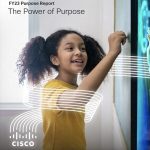The following is based on an excerpt from the 2020 CSR Impact Report, published on December 8, 2020.
Cisco’s grants and partnerships with nonprofit organizations make a big impact, but so does our technology. Consider innovators who use Cisco’s data analytics and collaboration tools to improve quality of life and reduce harm to the environment. Networking and security products that keep organizations safe. Quality healthcare anywhere. Solutions that allow work and education to continue without disruption.
Because we want everyone to reap the benefits of these breakthroughs, Cisco works with our customers in a variety of arrangements to help them achieve their goals. Through the Country Digital Acceleration (CDA) program, we partner with national leadership to help them progress on their digitization journeys, from installing public Wi-Fi to educating citizens in technology skills through Cisco Networking Academy. And with thought leadership on topics such as remote collaboration and the evolution of the workplace, we help businesses understand how to transform for an inclusive digital future where no one is left behind.
Country digital acceleration
Higher levels of digital readiness are associated with increased economic benefit. Given this well-established connection, countries around the world are looking for ways to deliver what’s possible with technology. But where is the best place to begin? And how can countries ensure that all citizens are included in the digital revolution?
Cisco launched CDA in 2015 to answer these questions. CDA programs are long-term partnerships with government leaders, industry, and academia designed to unlock the value of digitization. By modernizing infrastructure, creating new jobs, and fostering innovation and education across public and private sectors, we can create new value for countries, businesses, and citizens. Cisco is one of few organizations tackling digitization on the national level at this scale.
A CDA program begins with a review of a country’s national digital agenda and meetings with heads of state. If a program appears viable, Cisco develops a multiyear execution plan and budget. Country programs are tailored to local needs, ranging from cybersecurity and smart and connected cities to healthcare, education, utilities, and transportation. Cisco is one of few organizations tackling digitization on the national level at this scale.
The future of work
The nature of work is changing. A multigenerational workforce has new expectations for flexible work. COVID-19 may have permanently upended norms about remote work, particularly in sectors that may not have seriously considered it before. Against this backdrop, businesses must adapt to keep workers safe and productive while meeting the needs of their customers. Cisco has been developing secure remote collaboration solutions since 2006 and can help ensure that the future of work is productive and efficient. To meet the unprecedented demand for collaboration tools that emerged during the pandemic, for example, Cisco expanded its software capabilities so that businesses could stay connected, without compromising quality or security. Used inside Cisco offices, in remote settings, and by our customers, Cisco’s collaboration solutions provide the following personalized, secure, and reliable experiences for the modern workforce and educational institutions.
- Seamless collaboration with anyone, from anywhere, working in-sync with the Webex calling, messaging, meetings, and integration functionality they love
- Smart, hybrid work experiences with integrated collaboration devices
- Intelligent customer experiences with digital-first engagement
- Security, privacy, management, and insights that are built-in, not bolted-on
Remote collaboration tools can also reduce emissions related to business travel, whether by reducing flights taken or limiting daily commutes to work. For example, National Trust, a historical preservation nonprofit in the United Kingdom, spent £2 million a year on fuel for car travel before it started using Webex for meetings. After adopting Webex, an executive estimated that a single virtual meeting attended by participants across the country saved 1000 miles, or a total of 34 hours of car travel. Similarly, a recent Cisco report on the benefits of virtual meetings estimates that by holding 30 percent of in-person meetings virtually, the country of Sweden could reduce CO2 emissions by 550,000 tonnes.
Connectivity in critical settings
Hospitals and other healthcare facilities are some of the highest-stakes environments in which Cisco solutions operate. Digitization is becoming an increasingly important part of quality care, and Cisco supports over 17,000 healthcare organizations in 118 countries as a trusted partner. When lives are at stake, care providers can’t risk downtime or missing data. This has been especially true during the COVID-19 pandemic. As hospitals around the world responded to surges in capacity and new safety protocols, Cisco helped them scale with simple, packaged solutions and support to unlock government funding for new technology. Here are a few ways that our customers and partners are using Cisco solutions to deliver the very best care:
- Integrating Cisco DNA Spaces with STANLEY Healthcare to track the location of medical devices and other critical equipment, monitor the temperature of medications and vaccines, and monitor the safety of patients and staff
- Enabling a custom version of Webex on Samsung tablets to allow clinical staff to conduct virtual consultations and daily virtual rounds with the patients at their facilities in support of physical distancing
- Helping parents of newborns with congenital heart defects to safely monitor their babies’ health at home, while communicating with healthcare providers at University Hospitals via Cisco Jabber
- Using Webex to speak with patients awaiting diagnoses, using screen-sharing to display medical scans and video to create a deeper emotional connection
- Running Webex on Ava Robotics’ mobile robot, which family members and healthcare providers can use to “visit” family members in assisted living facilities while in quarantine
Visit our Cisco ESG Reporting Hub to read the full CSR Impact Report and learn more
about the progress we’re making to power a more inclusive future through CSR.



CONNECT WITH US